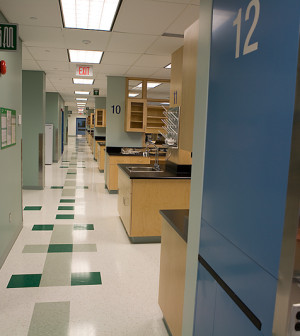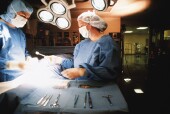- Does Preschool Boost Kids’ Long-Term Academic Success? Study Finds Mixed Results
- AI Might Spot Rare Diseases in Patients Years Earlier
- An Orangutan Healed Himself With Medicinal Plant
- Quit-Smoking Meds Not Working for You? Try Upping the Dose
- Fewer Americans Are Suffering Most Dangerous Form of Heart Attack
- Even Skipping Meat for One Meal Helps Liver Disease Patients
- You May Not Have to Fast Before Catheter-Based Heart Test, Study Suggests
- EPA Earmarks $3 Billion to Replace Lead Pipes Nationwide
- Johnson & Johnson Will Pay $6.5 Billion to Settle Talc Ovarian Cancer Lawsuits
- No Sign of Bird Flu in Ground Beef, USDA Says
Study Examines Effort to Preserve Voice During Thyroid Surgery


Close monitoring of the vocal cords during thyroid removal surgery benefits people who use their voice to make a living, according to a new study.
Researchers assessed a new approach on 30 voice professionals — including opera singers, Motown recording artists, a TV weather forecaster and rabbi cantors — who had all or part of the thyroid gland removed surgically (thyroidectomy).
This type of surgery can lead to vocal cord problems, said the authors of the study. It was scheduled for presentation Friday at the annual meeting of the American Association of Clinical Endocrinologists in Las Vegas.
“We do know that thyroid surgery is associated with nerve injury, vocal cord paralysis or nerve paralysis that can occur in up to 10 percent of thyroidectomies and can lead to voice loss and difficulty swallowing, so these are very, very important complications to avoid,” Dr. Gregory Randolph, of Massachusetts Eye and Ear Infirmary, said in an association news release.
“These issues are magnified when you’re dealing with a patient where such complications would not only involve loss of voice, but loss of career,” added Randolph, director of general otolaryngology and the division of thyroid and parathyroid surgery at the hospital.
The patients in the study had their vocal cords closely monitored during thyroid surgery, and all them had vocal cord function after the surgery.
Monitoring including fitting an endotrachial tube — which is used to help patients breathe while under general anesthesia — with electrodes that provided real-time data about the electrical activity of the vocal cords and nerves.
It’s also important for doctors to visually examine the back of the throat before and after surgery, Randolph said.
Research presented at meetings is considered preliminary until published in a peer-reviewed medical journal.
More information
The American Thyroid Association has more about thyroid surgery.
Source: HealthDay
Copyright © 2024 HealthDay. All rights reserved.










